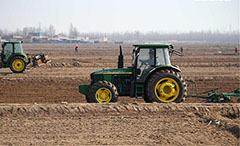China takes a step closer to green agriculture
2017-03-01
Xinhua
BEIJING — Chinese farmers apply 70 percent more chemicals on crops than the world average, but the country is taking a step closer to green agriculture by encouraging farmers to reduce the use of chemical fertilizers.
China’s Ministry of Agriculture (MOA) released an action plan earlier this month to pilot a fertilizer-replacement program in 100 counties and districts this year.
The plan will include vegetables produced in northern China’s greenhouses, apples grown in northwest China’s Loess Plateau and Bohai Bay area, and key growing areas for oranges, tangerines and tea.
Key growing areas for fruit, greenhouse vegetables and tea should cut chemical fertilizer use by at least 20 percent by 2020, under the plan.
The program is part of China’s effort to scale back use of chemical fertilizers and switch to organic alternatives.
National chemical fertilizer use amounts to around one-third of the world’s total consumption.
The amount of chemical fertilizers used in fruit growing in China per mu (1/15 hectare) is over twice the figure of Japan, six times the figure of the United States and seven times of that of European Union (EU).
Chemical fertilizer use per mu in vegetable growing is 12.8 kg more than in Japan, 29.7 kg more than the United States and 31.4 kg more than the EU, according to the MOA.
Some farmers have already felt the effects of using excess fertilizer, an issue plaguing the country’s high added-value produce.
Three years ago, Yue Zuozhong, a farmer, realized his land needed a rest after suffering low productivity, soil degradation and low fertility caused by excessive chemical fertilizer use.
“The land in my vegetable greenhouses became hard and impervious. I could no longer find earthworms,” said Yue from Shouguang city, eastern China’s Shandong province.
Yue decided to reduce use of chemical fertilizers, as encouraged by the city government. He resorted to bio-fertilizers as well as pig and chicken manure for his two vegetable greenhouses.
He said that one mu of vegetables only needed a dozen kilograms of bio-fertilizers and some pig and chicken manure. With government subsidies, farmers in Shouguang like Yue only need to pay 750 yuan to 1,050 yuan ($109 to $153) per tonne for bio-fertilizer. Pig and chicken manure costs around 120 yuan per cubic meter.
“My costs can be cut by half now,” Yue said. “But most importantly, by using organic fertilizers, the hardened land has become soft again and more easily permeated by water.”
China is encouraging targeted fertilization, the integration of water and fertilizer, and promoting green disease and pest control to ensure chemical fertilizer and pesticide consumption stops increasing by 2020.
As a major vegetable production and trading center, Shouguang provides one-third of the vegetables for Beijing. It has more than 800,000 mu of greenhouse vegetables, and since 2010 has encouraged farmers to use organic fertilizers to improve arable land.
“Longtime reliance on chemical fertilizers to boost production has resulted in hardening and secondary salinization of soil, as well as environmental pollution,” said Guo Yuesheng, vice head of the Soil and Fertilizer Station of Shandong. “Improper use of chemical fertilizers can also lead to a high level of heavy metal elements in the soil, which could threaten people’s health.”
Data from the MOA shows that using chemical fertilizers damages land fertility, with around 40 percent of workable land degenerating.
“Chemical fertilizers and pesticides are applied at the source of agricultural production. Preventing pollutants from entering soil is fundamental to ensuring safe agricultural produce,” said Qin Qingwu, a member of the China Agricultural Economy Society.
However, making the change is difficult as chemical fertilizers are much cheaper than organic alternatives and easier to transport.
To provide the same amount of nutrients, organic fertilizers cost around four times that of chemical fertilizer, according to Guo.
“We still have a long way to go to promote the use of organic fertilizers,” he said.
Yue said that little could be achieved without financial support and professional expertise.
“It is our hope that the government can continue to subsidize us and offer help to achieve sustainable farming,” he said.


